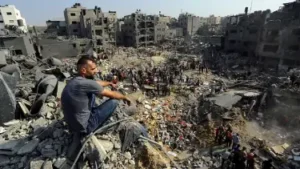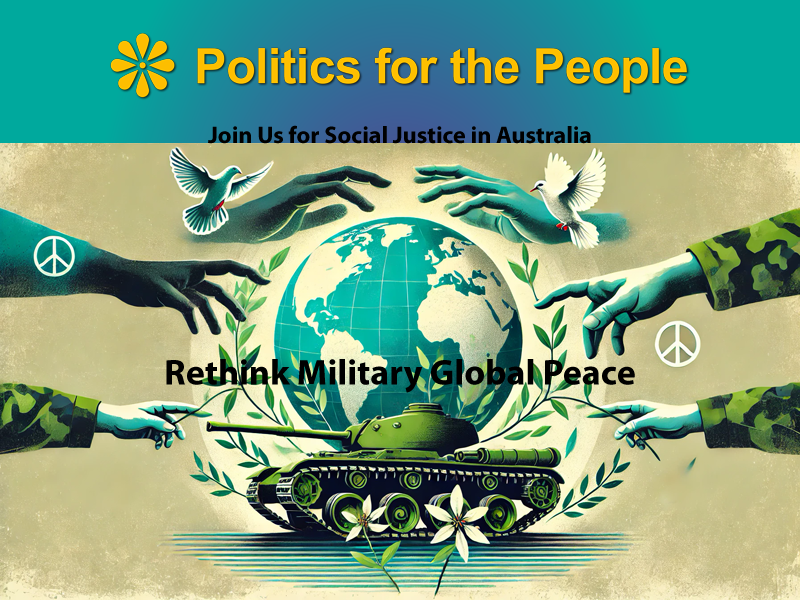Description: Rethink Military Global Peace
It’s time to seriously rethink military global peace. Explore the impact of the military-industrial complex on society and the environment, advocating for global unity and sustainable policies.
Introduction:
In an era when global challenges demand unified action, the expansive role of the military-industrial complex in shaping resource allocation starkly contrasts with the ideals of cooperation and peace. This article delves into the profound impacts of this complex on our world and explores the potential for rethink military global peace. It is time to rethink military global peace.
The Role of Military Power in Resource Allocation:
China, emerging as the world’s second-largest military spender, is paradoxically also championing initiatives like the Belt and Road Initiative, aiming to foster international cooperation. This dichotomy highlights the complex relationship between military power and global diplomacy, particularly when juxtaposed with the United States, another global economic powerhouse. Together, these nations have the potential to significantly alter the course of international relations and global peace.
The substantial military capabilities of China and the United States not only define their status on the global stage but also greatly influence their diplomatic relationships. When these powers prioritize military might over diplomatic efforts, it can escalate tensions and foster competition rather than cooperation. Conversely, if they choose to leverage their military influence towards collaborative global initiatives, the impact could be profoundly positive.
By aligning their military strategies with goals of peace and stability, and supporting international peacekeeping efforts, these nations could lead by example in transforming international relations. This shift to rethink military global peace could help reduce global conflicts and promote a more united approach towards pressing global challenges such as climate change, terrorism, and transnational crime, setting a new paradigm for how military power is perceived and used in the international arena.
Diversion of Resources by the Military-Industrial Complex:
A significant issue with the military-industrial complex is its intense resource consumption, which could otherwise support crucial societal needs. According to research cited by Gould (2007), vast amounts of economic resources are diverted away from education, healthcare, and poverty alleviation to sustain military endeavours. This diversion not only stagnates societal progression but also prioritizes defence spending over crucial public services.
The military-industrial complex’s allocation of substantial economic resources towards defense and military capabilities has profound effects on societal progress. This diversion often occurs at the expense of critical public sectors such as education, healthcare, and infrastructure development.
For instance, funds that could potentially modernize public school facilities, enhance healthcare services, or expand public transportation are instead channeled into developing advanced weaponry and maintaining military forces.
The impact of this resource allocation is multifaceted. In the realm of education, it can lead to outdated materials and facilities, larger class sizes, and reduced opportunities for teacher training and student enrichment activities. In healthcare, the implications are equally dire, with underfunded hospitals, shortages of medical professionals, and limited research for non-military medical advancements.
Infrastructure suffers as well, where roads, bridges, and public utilities that are essential for economic development receive minimal investment.
The stagnation of societal progress due to this diversion is not just a matter of lost opportunities. It represents a cycle of reduced potential for economic growth and social improvement. When education and healthcare systems are underfunded, the overall quality of life decreases, and the workforce becomes less competitive on a global scale.
This perpetuates a dependency on military spending as a driver of economic activity, which further entrenches the priorities of the military-industrial complex at the cost of broader societal needs.
Environmental Impact of Military Activities:

The environmental degradation linked to military activities is alarming. Vertegaal (1989) noted that the military is responsible for over 6% of global environmental degradation, including hazardous waste production, groundwater contamination, and air pollution. These activities pose severe risks to natural ecosystems and human health, necessitating a re-evaluation of priorities toward environmental sustainability.
Economic and Democratic Implications:
The economic disadvantages associated with the military-industrial complex extend beyond direct fiscal spending. As highlighted by Nadler (1963), this complex contributes to business stagnation and unemployment, complicates economic development with sanctions, and limits budgetary resources for other essential sectors. Furthermore, Ottosen (2009) argues that the influence of the military-industrial complex on democratic processes is growing, increasingly affecting decisions in U.S. foreign policy and beyond, posing a threat to democratic integrity worldwide.
Impact on Poverty and Development:
While the military-industrial complex may spur growth in certain industries, Kaplinsky (2011) argues that much of this development leads to environmental and health issues that disproportionately affect the poorest communities. True innovation and technological advancement for poverty reduction must consider the broader impacts, ensuring that development does not come at the expense of environmental or human health.
Vision for the Future:

Imagine the possibilities if the resources currently funnelled into the military-industrial complex were redirected towards global health, education, and environmental protection. Such a reallocation would not only improve the quality of life for millions but also secure a sustainable future for the next generations.
Conclusion:
The pervasive influence of the military-industrial complex is a significant barrier to global unity and environmental sustainability. As two of the world’s leading economies, the U.S. and China have a unique opportunity to lead by example, prioritizing peaceful cooperation over militaristic competition. By fostering policies that emphasize peace and sustainable development, we can begin to address the myriad issues threatening our planet and its inhabitants.
Engage with Us:
What kind of world do you want to leave for your children? It’s time to act. Educate yourself and others about these issues, advocate for peace-focused policies, and remember, change starts with you. Share your thoughts below and join the conversation on social media with these trending hashtags: #GlobalCooperation, #SustainableFuture, #PeaceNotWar, #InvestInOurFuture

